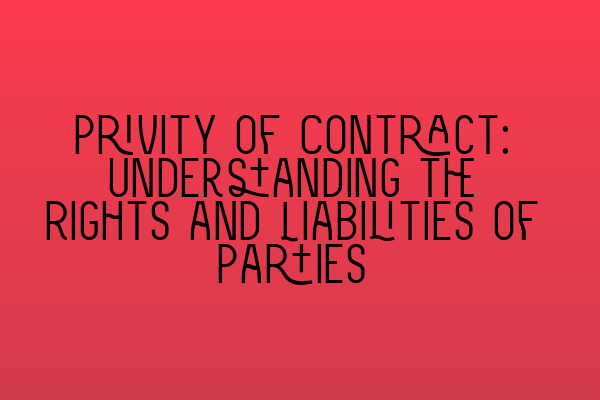Privity of Contract: Understanding the Rights and Liabilities of Parties
When it comes to contract law, one of the fundamental principles is the concept of privity of contract. Privity of contract refers to the idea that only parties who are privy to a contract have rights and liabilities under that contract. This means that third parties, who are not parties to the contract, generally do not have any enforceable rights or obligations arising from the contract.
Understanding the concept of privity of contract is crucial for anyone involved in contractual transactions, whether you are a business owner, an employee, or simply someone entering into a contractual agreement. In this article, we will delve deeper into the concept and explore its implications.
The Parties to a Contract
In order to understand privity of contract, let us first understand who the parties to a contract are. A contract is formed when two or more parties enter into a legally binding agreement. These parties can be individuals, businesses, or even organizations.
For example, let’s say John, an individual, enters into a contract with ABC Company, a business. In this scenario, John and ABC Company are the parties to the contract.
The Rights and Liabilities of Parties
When parties enter into a contract, they create legal rights and liabilities that bind them to certain obligations. These rights and liabilities are governed by the terms and conditions outlined in the contract.
For instance, if John and ABC Company agree that ABC Company will deliver a certain product to John and John will pay a specific sum of money in return, both parties have rights and liabilities under the contract. John has the right to receive the product and ABC Company has the obligation to deliver it. Similarly, ABC Company has the right to receive payment and John has the obligation to pay.
However, if John later decides to sell the product to XYZ Company, a third party, XYZ Company does not automatically become a party to the original contract between John and ABC Company. Therefore, XYZ Company does not have any enforceable rights or liabilities under that contract.
Exceptions to the Rule
While the general rule is that only parties to a contract have rights and liabilities, there are certain exceptions to this rule. One such exception is when a contract creates a trust relationship.
For instance, if John enters into a contract with ABC Company, but the contract specifies that the product is being purchased on behalf of XYZ Company, a trust relationship may be created. In this case, XYZ Company could potentially have rights and liabilities under the contract based on the trust relationship.
Another exception to the rule is when legislation allows for third-party rights. In some jurisdictions, legislation may grant third parties specific rights under certain types of contracts, such as insurance contracts or construction contracts.
Importance of Privity of Contract
The concept of privity of contract plays a vital role in contract law. It ensures that parties can rely on the terms and conditions of a contract without interference from third parties who are not privy to the agreement.
Privity of contract also provides clarity and certainty in contractual relationships. It allows parties to clearly define their rights and obligations, offering protection and assurance when entering into agreements.
Conclusion
Understanding privity of contract is essential for anyone involved in contractual transactions. It helps parties ascertain their rights and liabilities, and ensures that contractual agreements are enforceable between the parties involved.
If you found this article helpful, you may also be interested in the following related articles:
